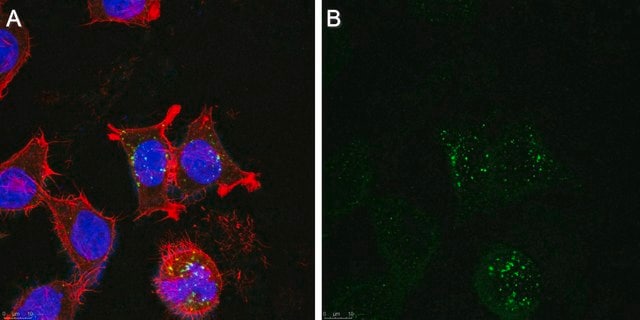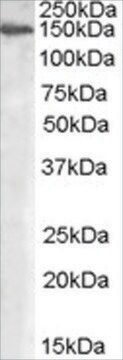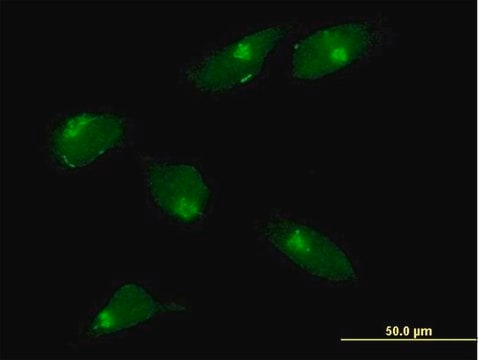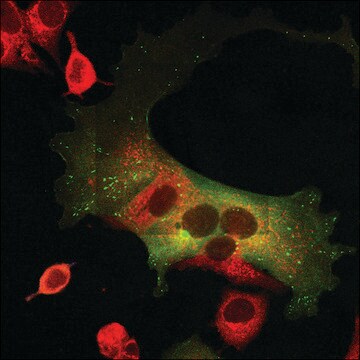AB3712
Anti-Mannosidase II Antibody, For Golgi Apparatus identification
serum, Chemicon®
Sign Into View Organizational & Contract Pricing
All Photos(1)
About This Item
UNSPSC Code:
12352203
eCl@ss:
32160702
NACRES:
NA.41
Recommended Products
biological source
rabbit
Quality Level
antibody form
serum
antibody product type
primary antibodies
clone
polyclonal
species reactivity
monkey, human
should not react with
mouse
manufacturer/tradename
Chemicon®
technique(s)
immunocytochemistry: suitable
immunohistochemistry: suitable
NCBI accession no.
UniProt accession no.
shipped in
dry ice
target post-translational modification
unmodified
Gene Information
human ... MAN2A1(4124)
Specificity
Mannosidase II. This antibody is a useful marker for golgi apparatus identification.
Immunogen
Epitope: For Golgi Apparatus identification
Purified peptide from human mannosidase II.
Application
Detect the Mannosidase II protein using this Anti-Mannosidase II, For Golgi Apparatus identification validated for use in ICC & IHC.
Immunocytochemistry on HeLa and COS7 cells
Immunohistochemistry on cold methanol fixed tissue.
Optimal working dilutions must be determined by end user.
Immunohistochemistry on cold methanol fixed tissue.
Optimal working dilutions must be determined by end user.
Research Category
Epitope Tags & General Use
Epitope Tags & General Use
Research Sub Category
Organelle & Cell Markers
Organelle & Cell Markers
Physical form
Rabbit serum. Liquid with 0.02% sodium azide.
Storage and Stability
Maintain unopened vial at -70C for up to 6 months. Avoid repeated freeze/thaw cycles.
The rehydrated antibody solutions can be stored undiluted at 2-8C° for 2 months without any significant loss of activity. Note, the solution is not sterile, thus care should be taken if product is stored at 2-8C°. For storage at -20C°, the addition of an equal volume of glycerol can be used, however, it is recommended that ACS grade or higher glycerol be used, as significant loss of activity can occur if the glycerol used is not of high quality.For freezing, it is recommended that the rehydrated antibody solution be further diluted 1:1 with a 2% BSA (fraction V, highest-grade available) solution made with the rehydration buffer. The resulting 1% BSA/antibody solution can be aliquoted and stored frozen at -70C° for up to 6 months. Avoid repeated freeze/thaw cycles.
The rehydrated antibody solutions can be stored undiluted at 2-8C° for 2 months without any significant loss of activity. Note, the solution is not sterile, thus care should be taken if product is stored at 2-8C°. For storage at -20C°, the addition of an equal volume of glycerol can be used, however, it is recommended that ACS grade or higher glycerol be used, as significant loss of activity can occur if the glycerol used is not of high quality.For freezing, it is recommended that the rehydrated antibody solution be further diluted 1:1 with a 2% BSA (fraction V, highest-grade available) solution made with the rehydration buffer. The resulting 1% BSA/antibody solution can be aliquoted and stored frozen at -70C° for up to 6 months. Avoid repeated freeze/thaw cycles.
Legal Information
CHEMICON is a registered trademark of Merck KGaA, Darmstadt, Germany
Disclaimer
Unless otherwise stated in our catalog or other company documentation accompanying the product(s), our products are intended for research use only and are not to be used for any other purpose, which includes but is not limited to, unauthorized commercial uses, in vitro diagnostic uses, ex vivo or in vivo therapeutic uses or any type of consumption or application to humans or animals.
Not finding the right product?
Try our Product Selector Tool.
Storage Class Code
10 - Combustible liquids
WGK
WGK 1
Certificates of Analysis (COA)
Search for Certificates of Analysis (COA) by entering the products Lot/Batch Number. Lot and Batch Numbers can be found on a product’s label following the words ‘Lot’ or ‘Batch’.
Already Own This Product?
Find documentation for the products that you have recently purchased in the Document Library.
Alex T-W Sin et al.
Molecular and cellular biology, 36(18), 2344-2359 (2016-06-22)
During the cell cycle, genetic materials and organelles are duplicated to ensure that there is sufficient cellular content for daughter cells. While Golgi growth in interphase has been observed in lower eukaryotes, the elaborate ribbon structure of the mammalian Golgi
Azumi Yoshimura et al.
Cells, 11(1) (2022-01-12)
In the early secretory pathway, the delivery of anterograde cargoes from the endoplasmic reticulum (ER) exit sites (ERES) to the Golgi apparatus is a multi-step transport process occurring via the ER-Golgi intermediate compartment (IC, also called ERGIC). While the role
Yuta Amagai et al.
Nature communications, 14(1), 2683-2683 (2023-05-10)
Many secretory enzymes acquire essential zinc ions (Zn2+) in the Golgi complex. ERp44, a chaperone operating in the early secretory pathway, also binds Zn2+ to regulate its client binding and release for the control of protein traffic and homeostasis. Notably
Laasya Dhandapani et al.
Journal of cell science, 135(1) (2021-12-14)
Oocytes spend the majority of their lifetime in a primordial state. The cellular and molecular biology of primordial oocytes is largely unexplored; yet, it is necessary to study them to understand the mechanisms through which oocytes maintain cellular fitness for
Our team of scientists has experience in all areas of research including Life Science, Material Science, Chemical Synthesis, Chromatography, Analytical and many others.
Contact Technical Service








